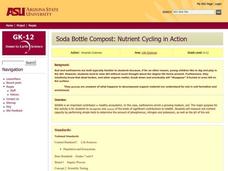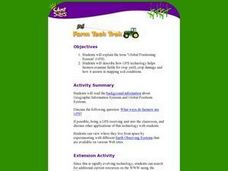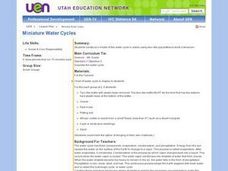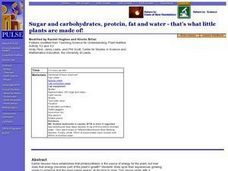Curated OER
Chemistry And The Nitrogen Cycle
Students investigate the factors that compose the nitrogen cycle. The harmful effects of acid rain and ozone depletion are also discussed in the lesson. Students define the nutrient that is often limiting to plant growth through...
Curated OER
The Water Cycle
Young scholars develop a better understanding of the need to conserve our renewable resources. In this water cycle lesson students take notes, complete a guide sheet and illustrate the water cycle.
Curated OER
Who Will Benefit if We Give Bulbs What They Need to Grow?
Students identify the elements needed for bulbs to grow. They raise tulips and give them to various members of the community. They identify local philanthropic communities and look for ways they can constructively donate time and give...
Curated OER
THE FARMER CARES FOR THE LAND
Students will identify cause and effect relationships in issues relating to Agriculture and the environment.Ask students to describe what farmers do. Then ask students to define the word "environmentalist." Ask students if they have...
Curated OER
What Plants Need
Students plant seeds in milk cartons, over the next two weeks, they watch the plants closely to see how they grow and change. They keep a photo journal to record the growth of the plant.
Curated OER
Our Special Planet Earth
Students explore what is special about our planet. They explore the various climates that are found on the planet Earth. Students create an advertisement to convince people why their favorite environment would be the best place to visit.
Curated OER
Rockin' Minerals
Third graders view a clip of the video Backyard Safari, "Rocks and Minerals," and discuss properties of rocks and minerals. They view and discuss a clip on where rocks and minerals are found.
Curated OER
Soda Bottle Compost: Nutrient Cycling in Action
Students investigate, through their own experimentation, the important role wildlife play in nutrient cycling. Earthworms and compost are used in this experiment and different experimental setups be evaluated.
Curated OER
Plants
Third graders study the factors necessary for plant growth and how plants adapt to their environment. They examine ow different plants require different environments to thrive.
Curated OER
Excretory System
Students discuss what happens to the trash in their home. They talk about what would happen if they didn't remove the trash. Students relate their home trash to the excretory system of their bodies. They label a diagram of the urinary...
Curated OER
Miniature Water Cycles
Students construct a model of the water cycle in action using two-liter pop bottles to build a terrarium. Locate examples of evaporation and condensation in the water cycle (e.g., water evaporates when heated and clouds or dew forms when...
Curated OER
The Web of Life - Ecosystem
Young scholars examine the concepts of ecosystems and interdependence. They construct block pyramids to demonstrate interdependence, and map off an area to observe and identify animals. They create food chain mobiles and play a web of...
Curated OER
Miniature Water Cycles
Fourth graders create a biome of their choosing in a terrarium. Terrariums are observed and results recorded daily for 2 weeks. They observe/record changes in the water within their terrarium and use the data to write sentences...
Curated OER
The Rock Cycle
Third graders study the 3 main types of rocks: igneous, sedimentary, metamorphic. They examine samples of these types of rocks and discuss ways to tell what kind of rock each is. They take notes and draw pictures in their science...
Curated OER
Oceanography (Rivers and Streams)
Second graders examine the characteristics of streams and rivers. They identify the types of resources lakes, ponds and oceans provide. They ask questions to complete the lesson.
Curated OER
Populations and Ecosystems
Sixth graders examine the factors that influence the stability of ecosystems. They construct a miniature ecosystem in a jar that includes plants, small fish, and snails, record the population changes over a period of four weeks, and...
Curated OER
Ecology: Factors Influencing Animal Populations
Young scholars assess the factors affecting animal populations. Working in groups they define specific vocabulary terms and complete several activities from "Project Wild."
Curated OER
Ecology and the Conservation of Natural Resources Lesson 2
Students compare and contrast abiotic and biotic factors. They discuss how these factors effect ecosystems. They answer questions to complete the lesson.
Curated OER
Web of Life
Students collect information about various organisms in a forest ecosystem and create a mural that depicts organism interdependence. They then simulate a food web using a ball of string.
Curated OER
So -- What's Happening Here, On This Old Christmas Tree Farm?
Students review their prior knowledge on biomes and ecosystems. At a local Christmas tree farm, they work together in groups to identify the changes occuring in the area. They participate in solving a mystery in which they determine the...
Curated OER
Sugar and carbohydrates, protein, fat and water - that's what little plants are made of!
Students identify photosynthesis as the mechanism by which plants convert sunlight energy into a usable energy source for plant processes. They identify photosynthesis as the mechanism by which plants create a molecule that can be used...
Curated OER
Investigating Monocots and Dicots
Students know about monocotyledons and dicotyledons. They explore the differences between the seed structure of the two by examining bean and corn seeds. They sprout seed to observe the differences in both of their growths.
Curated OER
Investigation Xylem
Students investigate how water travels up the stem of vascular plants by using food coloring to stain the xylem of a number of different plants. They know the function of leaves, stems, and root at the end of the experiment.

























